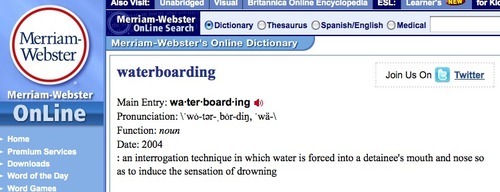I saw this the other day on Newsweek’s Tumblr, but felt that I needed some time to process what it means.
Wednesday, June 30, 2010
This, from a Harvard student study of a shameful chapter in American journalism, is well worth a read. The conclusion:
The results of this study demonstrate that there was a sudden, significant, shift in major print media’s treatment of waterboarding at the beginning of the 21st century. The media’s modern coverage of waterboarding did not begin in earnest until 2004, when the first stories about abuses at Abu Ghraib were released. After this point, articles most often used words such as “harsh” or “coercive” to describe waterboarding or simply gave the practice no treatment, rather than labeling it torture as they had done for the previous seven decades. There is also a significant discrepancy between the point of view offered by news articles and opinion pieces published in these papers. Opinion pieces were much more likely to characterize waterboarding as torture, suggesting that the private opinion of the editors and contributors did not align with the formal face the papers were presenting in their objective reporting.
Yet what caused this change in waterboarding’s treatment over time? Our data does not give any specific reason for this shift, but merely points to the existence of this change in syntax. A piece published by the public editor of The NY Times, Clark Hoyt, suggests that these choices were made deliberately by journalists and their editors, perhaps in an effort to remain neutral in the debate going on in the U.S. If the classification of waterboarding as torture is unclear, Hoyt suggests, then it is irresponsible for journalists to preempt this debate by labeling it as such.
The willingness of the newspapers to call the practice torture prior to 2004 seems to refute this claim. According to the data, for almost a century before 2004 there was consensus within the print media that waterboarding was torture. Yet once reports of the use of waterboarding by the CIA and other abuses by the U.S. surfaced, this consensus no longer held, despite the fact that the editors themselves seem to have still been convinced that waterboarding was torture, often labeling it as such in their editorials.
The classification of waterboarding is not unclear; the current debate cannot be so divorced from its historical roots. The status quo ante was that waterboarding is torture, in American law, international law, and in the newspapers’ own words. Had the papers not changed their coverage, it would still have been called torture. By straying from that established norm, the newspapers imply disagreement with it, despite their claims to the contrary. In the context of their decades‐long practice, the newspaper’s sudden equivocation on waterboarding can hardly be termed neutral.
I’m still not entirely sure what it means. For the sake of reference, I thought I’d read the definition of “waterboarding” in the Random House dictionary I used in college. After a few minutes of looking around my apartment for it, I came to the conclusion that I must have thrown it away.
Why would I have done that?
Because I can just look up meanings online—but after reading this about the supposed “paper of record” (aka the New York Times) I realized that the “first draft of history” for the last six years was inaccurate and odds are, any modern dictionaries would be equally inaccurate.
As an atheist, I hang onto my childhood Bible for sentimental reasons. Little did I know that I should have done the same with my childhood dictionary.
Well, at least Wiktionary has their definition of waterboarding mostly right—while they describe it as torture, they say that it “creates the sensation of drowning”—this is inaccurate since the definition of drowning dictates that death is not required for one to drown—therefore, waterboarding is forcibly drowning someone. It’s not just the “sensation” of drowning.
At least Wiktionary includes the word “torture” in the definition. But who knows about the future? If the New York Times is comfy calling waterboarding simply “harsh” or “coercive,” how long until other dictionaries like Oxford-American or Merriam-Webster agree?
Actually, I spoke too soon—Merriam-Webster DOES agree:
waterboarding 1. Main Entry: wa·ter·board·ing Pronunciation: \ˈwȯ-tər-ˌbȯr-diŋ, ˈwä-\ Function: noun Date: 2004 : an interrogation technique in which water is forced into a detainee’s mouth and nose so as to induce the sensation of drowningHA! They even say it’s just the “sensation” of drowning—and check out the date on that, too! >_<
Big Brother, this round goes to you, sir!
I've been trying to keep this kind of post confined to website666.com, but felt it was rather important.



No comments:
Post a Comment